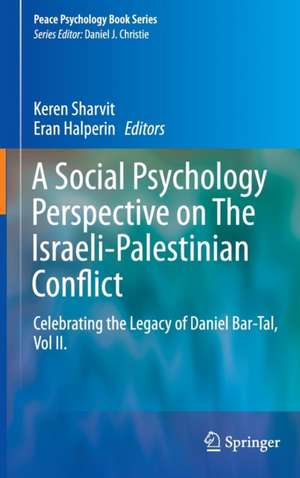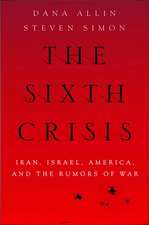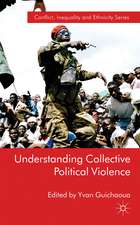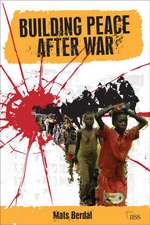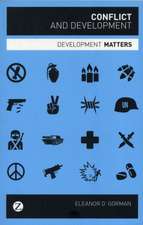A Social Psychology Perspective on The Israeli-Palestinian Conflict: Celebrating the Legacy of Daniel Bar-Tal, Vol II.: Peace Psychology Book Series
Editat de Keren Sharvit, Eran Halperinen Limba Engleză Hardback – 29 ian 2016
· Identity formation during conflict · The Israeli and Palestinian ethos of conflict
· The important role of Palestinian and Israeli education
· An analysis of the leadership in the Israeli-Palestinian peace process · The challenges and potential towards a road to peace in the region
All contributors to the volume are pre-eminent scholars of the Israeli-Palestinian conflict, and many of them have felt the influence of Bar-Tal’s formulations in their own work. A rich resource for those who are followers of Dr. Bar-Tal's work, for those who study intractable conflicts in all its forms, and for those who have a particular interest in the Israeli-Palestinian conflict, A Social Psychology Perspective of the Israeli-Palestinian Case offers a detailed exploration of the psychological underpinnings of the Israeli-Palestinian conflict and the barriers to and opportunities of the peace process.
| Toate formatele și edițiile | Preț | Express |
|---|---|---|
| Paperback (1) | 640.71 lei 6-8 săpt. | |
| Springer International Publishing – 30 mar 2018 | 640.71 lei 6-8 săpt. | |
| Hardback (1) | 647.08 lei 6-8 săpt. | |
| Springer International Publishing – 29 ian 2016 | 647.08 lei 6-8 săpt. |
Din seria Peace Psychology Book Series
- 18%
 Preț: 779.26 lei
Preț: 779.26 lei -
 Preț: 361.07 lei
Preț: 361.07 lei - 15%
 Preț: 639.25 lei
Preț: 639.25 lei - 18%
 Preț: 788.54 lei
Preț: 788.54 lei - 15%
 Preț: 699.28 lei
Preț: 699.28 lei - 15%
 Preț: 646.62 lei
Preț: 646.62 lei - 18%
 Preț: 1690.13 lei
Preț: 1690.13 lei - 15%
 Preț: 645.28 lei
Preț: 645.28 lei - 24%
 Preț: 1044.87 lei
Preț: 1044.87 lei - 18%
 Preț: 945.14 lei
Preț: 945.14 lei - 15%
 Preț: 649.54 lei
Preț: 649.54 lei -
 Preț: 386.39 lei
Preț: 386.39 lei - 15%
 Preț: 697.82 lei
Preț: 697.82 lei - 15%
 Preț: 591.14 lei
Preț: 591.14 lei - 18%
 Preț: 1222.94 lei
Preț: 1222.94 lei - 15%
 Preț: 644.82 lei
Preț: 644.82 lei - 15%
 Preț: 649.22 lei
Preț: 649.22 lei - 15%
 Preț: 697.65 lei
Preț: 697.65 lei -
 Preț: 388.72 lei
Preț: 388.72 lei - 24%
 Preț: 967.03 lei
Preț: 967.03 lei - 15%
 Preț: 638.89 lei
Preț: 638.89 lei - 15%
 Preț: 650.37 lei
Preț: 650.37 lei - 18%
 Preț: 733.15 lei
Preț: 733.15 lei -
 Preț: 398.74 lei
Preț: 398.74 lei - 15%
 Preț: 644.30 lei
Preț: 644.30 lei - 18%
 Preț: 1116.57 lei
Preț: 1116.57 lei -
 Preț: 365.05 lei
Preț: 365.05 lei - 15%
 Preț: 643.99 lei
Preț: 643.99 lei - 18%
 Preț: 1116.26 lei
Preț: 1116.26 lei - 18%
 Preț: 1381.26 lei
Preț: 1381.26 lei - 18%
 Preț: 1595.75 lei
Preț: 1595.75 lei - 18%
 Preț: 779.89 lei
Preț: 779.89 lei
Preț: 647.08 lei
Preț vechi: 761.27 lei
-15% Nou
Puncte Express: 971
Preț estimativ în valută:
123.83€ • 134.47$ • 104.02£
123.83€ • 134.47$ • 104.02£
Carte tipărită la comandă
Livrare economică 22 aprilie-06 mai
Preluare comenzi: 021 569.72.76
Specificații
ISBN-13: 9783319248394
ISBN-10: 3319248391
Pagini: 287
Ilustrații: XIV, 287 p. 7 illus., 1 illus. in color.
Dimensiuni: 155 x 235 x 18 mm
Greutate: 0.6 kg
Ediția:1st ed. 2016
Editura: Springer International Publishing
Colecția Springer
Seria Peace Psychology Book Series
Locul publicării:Cham, Switzerland
ISBN-10: 3319248391
Pagini: 287
Ilustrații: XIV, 287 p. 7 illus., 1 illus. in color.
Dimensiuni: 155 x 235 x 18 mm
Greutate: 0.6 kg
Ediția:1st ed. 2016
Editura: Springer International Publishing
Colecția Springer
Seria Peace Psychology Book Series
Locul publicării:Cham, Switzerland
Public țintă
ResearchCuprins
Preface.- 1.- Socio-psychological foundations of the Israeli-Palestinian conflict: Applying Daniel Bar-Tal’s theorizing.- Part 1: Acquisition of the Socio-Psychological Repertoire.- 2.Stereotypes and prejudice in conflict: A developmental perspective.- 3.Young children’s experiences and learning in intractable conflicts.- Part 2: Collective Memory and Narratives.- 4.The Israeli collective memory of the Israeli-Arab/Palestinian conflict: Its characteristics and relation to the conflict.- 5.The “silenced” narrative of 1948 War events among young Palestinians in Israel.- 6. Perceptions of collective narratives among Arab and Jewish adolescents in Israel: A decade of intractable conflict.- Part 3: Societal B
eliefs and Ethos.- 7.“Seeing through a glass darkly”: Israeli and Egyptian images of the other during the Nasserite period (1952-1970).- 8.The Jewish- Israeli ethos of conflict.- 9.Ethos of conflict of the Palestinian society.- Part 4: Distress, emotions and ideology.- 10. Harmed by our protection: Exposure to political violence and political preferences in the range of fire.- 11. Emotions and emotion regulation in intractable conflict and their relation to the ethos of conflict in Israeli society.- Part 5: The role of education.- 12. When Jewish and Zionist identities encounter otherness: Educational case study.- 13. Peace education between theory and practice: The Israeli case.- Part 6: Prospects for change?.- 14. Containing the duality: Leadership in the Israeli-Palestinian peace process.- 15. The role of peace organizations during peacemaking processes: the case of the Jewish Israeli society.- 16. The road to peace? The potential of structured encounters between Israeli Jews and Palestinians in promoting peace.- 17. Addressing Israelis' and Palestinians' basic needs for agency and positive moral identity facilitates mutual prosociality.- 18. Transitional justice in societies emerging from intractableconflicts: Between the right to truth and collective memory
eliefs and Ethos.- 7.“Seeing through a glass darkly”: Israeli and Egyptian images of the other during the Nasserite period (1952-1970).- 8.The Jewish- Israeli ethos of conflict.- 9.Ethos of conflict of the Palestinian society.- Part 4: Distress, emotions and ideology.- 10. Harmed by our protection: Exposure to political violence and political preferences in the range of fire.- 11. Emotions and emotion regulation in intractable conflict and their relation to the ethos of conflict in Israeli society.- Part 5: The role of education.- 12. When Jewish and Zionist identities encounter otherness: Educational case study.- 13. Peace education between theory and practice: The Israeli case.- Part 6: Prospects for change?.- 14. Containing the duality: Leadership in the Israeli-Palestinian peace process.- 15. The role of peace organizations during peacemaking processes: the case of the Jewish Israeli society.- 16. The road to peace? The potential of structured encounters between Israeli Jews and Palestinians in promoting peace.- 17. Addressing Israelis' and Palestinians' basic needs for agency and positive moral identity facilitates mutual prosociality.- 18. Transitional justice in societies emerging from intractableconflicts: Between the right to truth and collective memory
Textul de pe ultima copertă
Due to its intensity and extensive effects both locally and globally, the Israeli-Palestinian conflict has drawn the attention of scholars from numerous disciplines, who attempt to explain the causes of the conflict and the reasons for the difficulties in resolving it. Among these one can find historians, geographers, political scientists, sociologists and others. This volume explores the Israeli-Palestinian conflict from a social psychology perspective. At the core of the book is a theory of intractable conflicts, as developed by Daniel Bar-Tal of Tel Aviv University, applied to the Israeli-Palestinian conflict.
Opening with an introduction to the Israeli-Palestinian conflict situation and a few chapters on the theoretical backgrounds of the creation of a societal ethos of conflict, the volume then moves to an analysis of the psycho-social underpinnings of the conflict, while concluding with a discussion of the possibility of long-standing peace in the region. Among the topics included in the coverage are:
. Identity formation during conflict
· The Israeli and Palestinian ethos of conflict
· The important role of Palestinian and Israeli education
· An analysis of the leadership in the Israeli-Palestinian peace process
· The challenges and potential towards a road to peace in the region
All contributors to the volume are pre-eminent scholars of the Israeli-Palestinian conflict, and many of them have felt the influence of Bar-Tal’s formulations in their own work. A rich resource for those who are followers of Dr. Bar-Tal's work, for those who study intractable conflicts in all its forms, and for those who have a particular interest in the Israeli-Palestinian conflict, A Social Psychology Perspective of the Israeli-Palestinian Case offers a detailed exploration of the psychological underpinnings of the Israeli-Palestinian conflict and the barriers to and opportunities of the peace process.
Opening with an introduction to the Israeli-Palestinian conflict situation and a few chapters on the theoretical backgrounds of the creation of a societal ethos of conflict, the volume then moves to an analysis of the psycho-social underpinnings of the conflict, while concluding with a discussion of the possibility of long-standing peace in the region. Among the topics included in the coverage are:
. Identity formation during conflict
· The Israeli and Palestinian ethos of conflict
· The important role of Palestinian and Israeli education
· An analysis of the leadership in the Israeli-Palestinian peace process
· The challenges and potential towards a road to peace in the region
All contributors to the volume are pre-eminent scholars of the Israeli-Palestinian conflict, and many of them have felt the influence of Bar-Tal’s formulations in their own work. A rich resource for those who are followers of Dr. Bar-Tal's work, for those who study intractable conflicts in all its forms, and for those who have a particular interest in the Israeli-Palestinian conflict, A Social Psychology Perspective of the Israeli-Palestinian Case offers a detailed exploration of the psychological underpinnings of the Israeli-Palestinian conflict and the barriers to and opportunities of the peace process.
Caracteristici
Explores the the Israeli-Palestinian Conflict from a social-psychology perspective Presents the potential and limitations in the Israeli-Palestinian peace process A tribute to the legacy of Daniel Bar-Tal, demonstrating his influence and contribution to the study of the Israeli-Palestinian Conflict Includes supplementary material: sn.pub/extras
